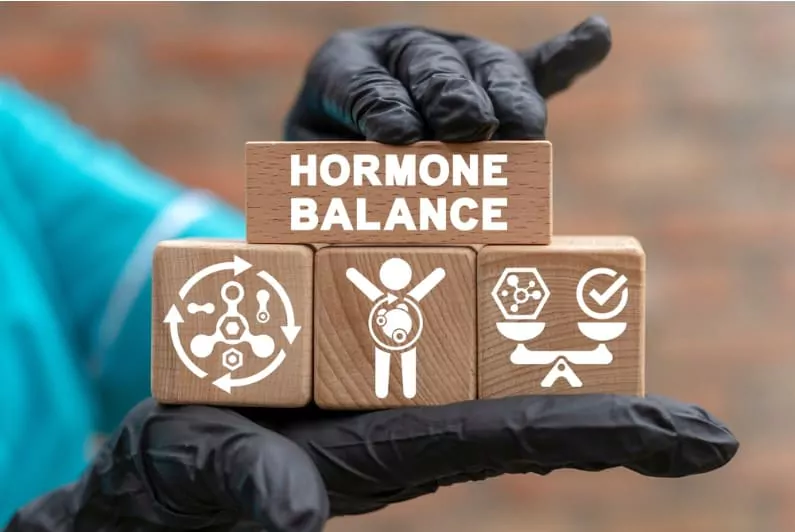How To Balance Hormones Naturally? Diet & Tips

The importance of balanced hormones is often underestimated. Hormones are chemical messengers that tell our cells what to do and when. They are vital for numerous bodily functions such as growth and development, metabolism, mood, sexual function, reproduction, and much more. When the delicate balance of hormones in our bodies is disrupted, it can lead to various health problems such as mood swings, weight gain, fatigue, insomnia, and a host of other health issues. In this article, we will dive into the science of hormones and discuss various strategies on how to balance hormones naturally.
1 What are Hormones?
Before we dive into the main question, “How to balance hormones naturally?” Let’s briefly explore what hormones are. Essentially, hormones are chemical messengers created in the endocrine glands. They are responsible for controlling most major bodily functions, from hunger to emotions and growth to sexual function.
When our hormones are balanced, our bodies work as they should. But when they’re imbalanced, we can encounter a wide range of health issues, including fatigue, weight gain, mood disorders, and even chronic diseases.
2 Understanding Hormonal Imbalance
Before diving into how to balance hormones naturally, it’s essential to understand what a hormonal imbalance is. A hormonal imbalance occurs when your body produces too much or too little of a certain hormone. Even the smallest fluctuations in hormone levels can have a significant impact on your health. Some common symptoms of hormonal imbalance include fatigue, weight changes, mood swings, sleep issues, skin problems like acne, and irregular periods in women.
There are several reasons for hormonal imbalances, including chronic stress, unhealthy eating habits, a sedentary lifestyle, insufficient sleep, and underlying health conditions like diabetes or thyroid disorders.
3 Symptoms of Hormonal Imbalance
Understanding the symptoms of hormonal imbalance is key to recognising when your body is out of sync. These can include:
- Unexplained weight gain or weight loss
- Difficulty sleeping
- Changes in heart rate
- Changes in appetite
- Mood swings and anxiety
- Dry skin or skin rashes
- Changes in menstruation and libido
If you’re experiencing these symptoms, you may be asking, “How to balance hormones naturally?” Fortunately, various lifestyle changes and natural strategies can help.
4 How to Balance Hormones Naturally?
Eat a Healthy and Balanced Diet

Proper nutrition is the cornerstone of a healthy body and balanced hormones. Eating a diet rich in whole foods, fruits, vegetables, lean proteins, and healthy fats can provide your body with the nutrients it needs to produce hormones efficiently. Avoid processed foods, refined carbohydrates, and sugars, which can cause inflammation and disrupt hormone production. Include more fibre-rich foods in your diet, as they help remove excess hormones from the body.
A significant hormone-regulating mineral is magnesium, which is found in foods like spinach, almonds, black beans, and avocados. Omega-3 fatty acids, found in fatty fish, walnuts, and flaxseeds, are crucial for hormone health as they reduce inflammation and aid in hormone production.
Exercise Regularly

Regular physical activity is another powerful tool to balance hormones naturally. Exercise helps to reduce insulin levels and increase insulin sensitivity, preventing conditions like diabetes. It also helps in regulating other hormones like serotonin, cortisol, and adrenaline, thereby boosting your mood and reducing stress. Aim for at least 150 minutes of moderate-intensity or 75 minutes of high-intensity exercise per week.
Stress Management
Chronic stress can wreak havoc on your hormones. When you are stressed, your body produces high amounts of cortisol, known as the “stress hormone.” Prolonged high cortisol levels can lead to weight gain, anxiety, digestive problems, and heart disease. Techniques such as mindfulness, yoga, deep breathing, and meditation can help reduce stress and balance cortisol levels.
Proper Sleep

Quality sleep is crucial for hormone balance. Hormones like melatonin (controls sleep cycles), growth hormones (promotes cell repair), and cortisol (controls metabolism and stress response) are all influenced by your sleep patterns. Lack of sleep or irregular sleep patterns can disrupt these hormones. Hence, prioritising a good night’s sleep is as important as healthy eating and regular exercise.
Limit Caffeine and Alcohol
Excessive caffeine and alcohol can disrupt the delicate balance of hormones in your body. Caffeine can interfere with sleep and increase cortisol levels, while alcohol can affect the liver’s ability to metabolise hormones, leading to hormonal imbalances. Try reducing your caffeine and alcohol intake, and substitute them with herbal teas, water, or other non-alcoholic beverages.
Support Gut Health
The health of your gut plays a significant role in hormone balance. A healthy gut microbiota helps metabolise hormones efficiently and supports the endocrine system. Consuming fermented foods like yoghurt, kimchi, and sauerkraut or taking a high-quality probiotic can enhance gut health, contributing to balanced hormones.
Essential Oils
Essential oils have been used for centuries to manage hormonal symptoms. Clary sage is known to balance estrogen levels, while thyme oil can increase progesterone. Lavender oil is popular for reducing stress and promoting sleep. However, remember to use these oils responsibly and consult with a healthcare provider before starting any new treatment.
Maintain a Healthy Weight

Weight plays a crucial role in hormone health. Excess body fat, particularly in the abdominal area, can lead to overproduction of certain hormones, like insulin and estrogen, leading to imbalances. Therefore, maintaining a healthy weight through proper diet and regular exercise can significantly contribute to balanced hormones.
Limit Exposure to Endocrine Disruptors
Endocrine disruptors are chemicals that interfere with hormone functions. They can be found in various everyday items like plastics, canned foods, cleaning products, cosmetics, and pesticides. Limiting exposure to these chemicals by choosing glass over plastic, organic foods over conventionally grown ones, and natural personal care products over synthetic ones can help maintain hormonal balance.
Regular Medical Check-ups

Finally, regular medical check-ups can help detect any hormonal imbalances early. If you suspect you have a hormonal imbalance, your doctor can perform blood tests to confirm this and provide appropriate treatment.
5 Nutrition: The Cornerstone to Balance Hormones Naturally

When considering how to balance hormones naturally, nutrition plays a vital role. Here are some specific foods and nutrients that can support hormone health:
- Protein: Consuming adequate protein triggers the release of hormones that control appetite and food intake.
- Healthy Fats: Incorporating healthy fats in your diet, such as avocados, fatty fish, nuts, and olive oil, can help optimise hormone health. They can aid in the absorption of certain hormones and reduce inflammation.
- Fibre: Dietary fibre can help manage your insulin levels, reducing the risk of diabetes. Foods rich in fibre include fruits, vegetables, whole grains, and legumes.
- Green Tea: Known for its metabolism-boosting effects, green tea can also aid in regulating the hormone insulin.
- Flaxseeds: Rich in a substance called lignans, flaxseeds can help balance oestrogen levels in the body.
6 Wrapping Up
Learning how to balance hormones naturally involves a comprehensive approach to your lifestyle, including your diet, physical activity, sleep, stress management, and more. It’s about nurturing your body, mind, and spirit and acknowledging the interconnectedness of these aspects in your overall health. While this might sound overwhelming, even small changes can lead to significant improvements.
Implementing these strategies might not bring instant results, but over time, they can significantly enhance your health and well-being. Always remember each person’s body is unique. What works for one person might not work for another. It’s essential to listen to your body, understand its needs, and adapt your lifestyle accordingly.
Community Q&A
About This Article
This article has been viewed 444 times.



